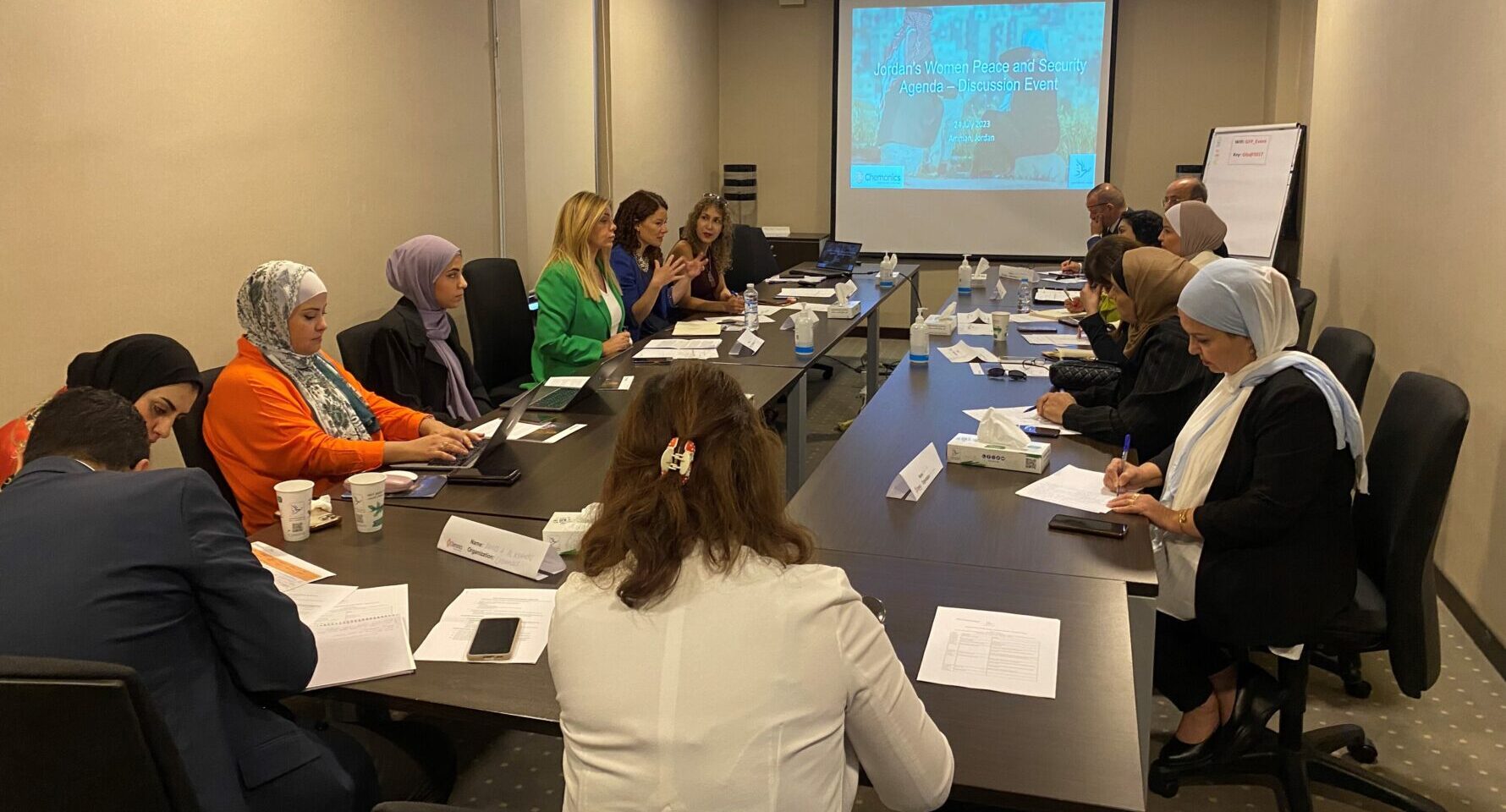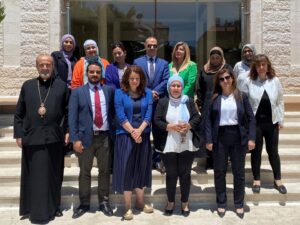
The Women, Peace and Security Agenda in Jordan – Reflecting and Learning
September 18, 2023 | 5 Minute ReadHow can we ensure sustainability for the Women, Peace and Security agenda in Jordan? Chemonics UK reflects and learns from Jordanian experts.
Bordered by Syria, Iraq, and Saudi Arabia – countries who consistently rank amongst the lowest for gender equality – the Government of Jordan have often prided themselves in being a leader in the Middle East in women’s rights and in advancing the Women, Peace and Security (WPS) agenda.
In 2018, the Government of Jordan took a historic step for Jordan’s WPS agenda with the launch of JONAP 1325 – the Jordanian Action Plan (JONAP I) for advancing the implementation of the United Nations (UN) Security Council Resolution 1325 (UNSCR 1325) on Women, Peace and Security. The development, launch, and implementation of JONAP I from 2018 to 2021, followed by JONAP II from 2022 to 2025, demonstrates an immense continued commitment towards achieving the goals of UNSCR 1325. The landmark resolution emphasises the important role of women in peacekeeping, peacebuilding, and conflict prevention, as well as advocating for their equal participation and full involvement in such efforts.
On 24 July 2023, Chemonics UK organised a roundtable event in Amman to discuss, reflect on, and learn about the WPS agenda in Jordan and JONAP I with a handful of Jordanian experts. Joined by religious and community leaders, civil society organisations (CSOs), women’s rights organisations (WROs), and figures such as Mayada Al-Shreim, a Member of the Jordanian Parliament, the event provided the space for the participants to share their informed views as well as their lived experiences. Set in a roundtable setting and co-hosted by Generations For Peace at their Amman offices, the discussions were guided by questions seeking to understand the political and social landscape of Jordan:
- What initiatives are in place to cultivate political support for the WPS in Jordan?
- What worked well and what are the lessons learned from the implementation of JONAP 1325?
- How should we advance WPS more effectively and sensitively?
- How could we ensure that WPS interventions are sustainable?
- Which actors need to be engaged?

Lessons Learnt from JONAP I
With JONAP I having concluded in 2021 and JONAP II currently running until 2025, there was clearly much to celebrate about JONAP I and a continuing appetite to advance WPS in Jordan. Key JONAP I objectives were achieved as there was an improvement in the proportion of women across Jordanian security and military institutions (2.2% increase) and UN peacekeeping missions (2.85% increase), fulfilling the first of UNSCR 1325’s four pillars of Participation; Protection; Prevention; and Relief and Recovery.
However, discussions drawn from our roundtable event in Amman put forward feedback which could contribute to the successful delivery of JONAP II. Participants commented that there was a lot of emphasis on the first pillar (Participation) during JONAP I – with much of the focus on women’s participation in UN peacekeeping missions – whilst the other 3 pillars (Protection; Prevention; and Relief) were overlooked by both UN Women and The Jordanian National Commission for Women. The other pillars are crucial for CSOs and WROs to be able to have access, influence, and space to contribute to and lead WPS policy and, ultimately, for the successful implementation of JONAP II and its WPS agenda.
Making Women, Peace and Security interventions more sustainable
Beyond just analysing the UN’s WPS interventions, it is important to understand what would make WPS interventions more sustainable in Jordan overall.
A recurring theme identified was that WPS interventions in Jordan cannot be sustainable, or indeed successful, until there is a greater recognition of the role that culture and religion play for the status of women’s rights in Jordan. As many of the participants at our roundtable event pointed out, Jordan has its own social and tribal system which affects the political scene in Jordan. Some tribal leaders still believe that it should always be men in leading roles to solve conflicts and issues at a community level, a view which often stagnates the efforts and achievements of women within these communities, and a view that is even shared by some male parliamentarians in the Jordanian parliament.
The Government of Jordan has exhibited some commitment to advancing women’s political participation. For example, the lowest quota for the women members of any political party should not be less than 20% as per stipulated in the new elections and parties’ law. However, amidst a dominating masculine culture in the parliament and Jordanian society’s traditional patriarchal approaches, women still struggle to push women-led political messages and efforts even as elected officials, as Mayada Al-Shreim MP shared. WROs, women’s rights defenders, and feminist activists face physical and online intimidation and harassment for their perceived breach of cultural and social norms. They are pushed by the Jordanian government to be oriented toward social protection delivery rather than being policy and political actors in WPS, they face long wait times for governmental approval of projects, and they do not have space for collaboration as they struggle with operational and funding limitations. Through this discussion, we learnt about the importance of creating avenues for collaboration and learning and sharing between CSOs and WROs.
Key Takeaways
The insights and knowledge gained from the discussions at our event, from Chemonics International’s staff running various projects in Jordan, and our interactions with local Jordanian CSOs and WROs, have led us to conclude several takeaways about what it takes to implement WPS successfully and sustainably.
Working with the British Embassy in Amman, CSOs and WROs, and their local networks across Jordan is key, recognising that different parts of Jordan have different demographics and varying social and security challenges. For example, Syrian refugees comprise 21% of the Irbid governorate in the north, causing strains on its housing, economic, and social systems, whilst Zarqa in the centre of Jordan faces high youth unemployment and the risk of radicalisation.
Another key takeaway is the importance of building a better understanding – amongst WROs, CSOs, government actors, and security sector actors, as well as the wider public – that WPS is more than just building up women’s participation in peacebuilding. In fact, the WPS agenda is part of a wider discussion about the overall lack of political empowerment and political participation of women in Jordan.
Finally, cultural and social norms that continue to suppress and restrict feminist activists and women-led political messages need to be challenged. Feminist activists and WROs cannot do this alone – support from male allies, particularly from political, community and religious leaders, as well as support from other women themselves is crucial for change to happen.
With an ambition to support the WPS agenda and Gender Equality and Social Inclusion (GESI) practices in Jordan and beyond, Chemonics UK is proud to have submitted a bid proposal to the UK Government’s Foreign, Commonwealth & Development Office (FCDO) as part of their Conflict, Stability and Security Fund (CSSF) – CSSF Jordan: Women Peace and Security System Strengthening (WPSSS).
Banner image caption: Chemonics UK’s roundtable event in Amman, Jordan with Chemonics UK staff engaging with Jordanian experts. The photo was taken by a Chemonics UK staff member.
Posts on the blog represent the views of the authors and do not necessarily represent the views of Chemonics.



